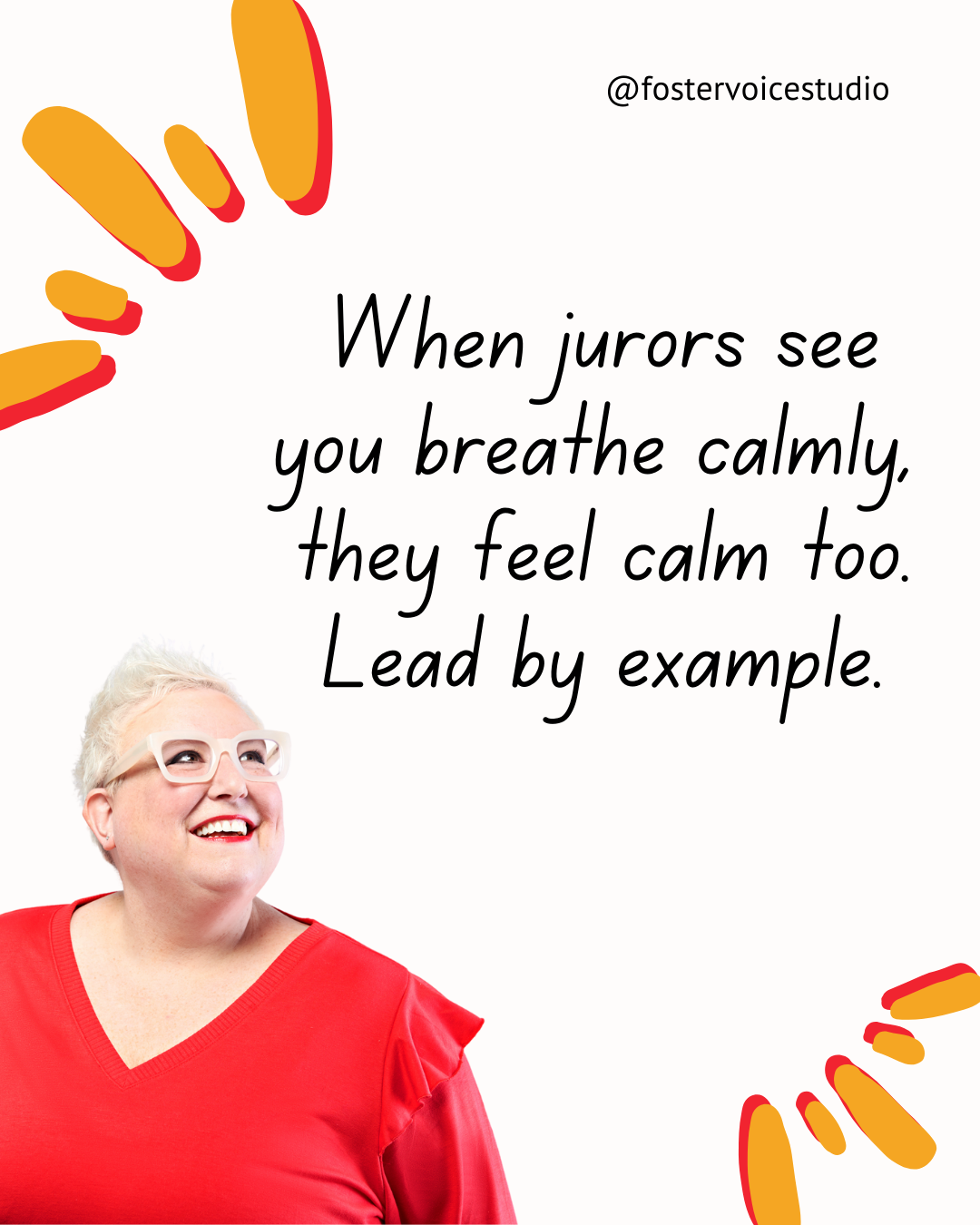The Secret Weapon in Courtroom Communication: Your Breath
You breathe all day long, every day. But here’s the thing—how you breathe directly impacts your voice, your nervous system, and even your jury’s ability to stay calm, focused, and receptive.
Your breath doesn’t just fuel your words. It sets the energetic vibe—or emotional temperature—of the whole room.
Why Breath Matters for Your Voice
Your vocal cords are tiny—about the size of a dime. Any tension in your chest, shoulders, or neck restricts their freedom to vibrate.
-
Shallow chest breathing = tight muscles, strained sound, vocal fatigue.
-
Low, abdominal breathing = free throat, steady airflow, powerful sound.
When you initiate breath with your abdominal muscles, you give your voice a sustainable power source instead of forcing your vocal cords to do the heavy lifting.
Breath and Your Nervous System
Breathing isn’t just about oxygen—it’s about regulation.
-
Shallow, quick breaths activate your sympathetic nervous system (fight-or-flight). Great for running from danger, not so great for commanding the courtroom.
-
Slow, steady breaths activate your parasympathetic nervous system (rest-and-digest). That’s where clarity, calm, and grounded leadership live.
The key? You can be strategic with your breathing. Even though it’s automatic most of the time, you can consciously choose when to shift gears and regulate the energy in the room.
Your Breath Is Contagious
Here’s the fascinating part: your breathing doesn’t just affect you—it affects everyone watching you.
Humans are wired for physiological mirroring. We unconsciously sync with the body rhythms of others.
-
If you breathe shallow and fast → jurors mirror that → restlessness, tension, distraction.
-
If you breathe slow and grounded → jurors mirror that → calm, focus, openness.
Your breath literally sets the state where calm thinking, empathy, and good decision-making live.
Your breath is leadership.
A Practical Example
Imagine voir dire. You’re nervous, chest tight, breaths shallow. If you push through, jurors will feel that unease.
Instead:
-
Pause as the jury enters.
-
Inhale deeply into your belly.
-
Exhale slowly, letting your shoulders drop.
-
Hold steady eye contact with a calm, pleasant expression.
That single breath regulates you and sets the tone for the room.
The Science Behind It
Two key players make this possible:
-
Mirror neurons → the reason yawns, smiles, and yes, breathing patterns are contagious.
-
The vagus nerve → stimulated by deep abdominal breathing. Activation lowers heart rate, calms the body, and signals safety.
When jurors feel safe, their brains are free to learn, process, and decide.
How to Practice Strategic Breathing
Low, abdominal breathing takes practice. To build the habit, use transitional moments in your day:
-
Every time you close your car door → one deep belly breath with a long exhale.
-
Every time you pick up a file → sigh out before opening it.
-
Every time you rise to speak → pause for one full breath before beginning.
These micro-practices train your body to default to calm, regulated breathing when it counts most.
Closing Takeaway
-
Breath powers your voice.
-
Breath regulates your nervous system.
-
Breath sets the emotional temperature for your jury.
When you breathe shallow and fast, you pull the room into tension.
When you breathe slow and steady, you create clarity—for yourself and your jurors.
Sometimes the most powerful thing you say isn’t spoken—it’s modeled in the calm of your breath.
This week, practice breathing not just for yourself, but for the room you’re leading. Because when you breathe well, you don’t just foster your own voice—you foster the environment where your jurors can truly hear it.
LET'S STAY CONNECTED
You’re already speaking. Let’s make it count.
Get one smart, time-saving vocal tip each Tuesday to help jurors learn faster, retain more, and stay connected — so your message lands the first time.
You're safe with me. I'll never spam you or sell your contact info.


